试卷简介
试卷预览
Passage One
The ups and downs of life may seem to have no predictable plan. But scientists now know there are very definite life patterns that almost all people share. Today, when we live 20 years longer than our great-grandparents, and when women mysteriously outlive men by seven years, it is clearer than ever that the “game of life” is really a game of trade-offs. As we age, we trade strength for ingenuity, speed for thoroughness, and passion for reason. These exchanges may not always seem fair, but at every age, there are some advantages. So it is reassuring to note that even if you’ve passed some of your “prime”, you still have other prime years to experience in the future. Certain important primes seem to peak later in time.
WHEN ARE YOU HEALTHIEST? For men, from 15 to 25; for women 15 to 30.
“A man is in his best shape in the decade before age 25,” says New York
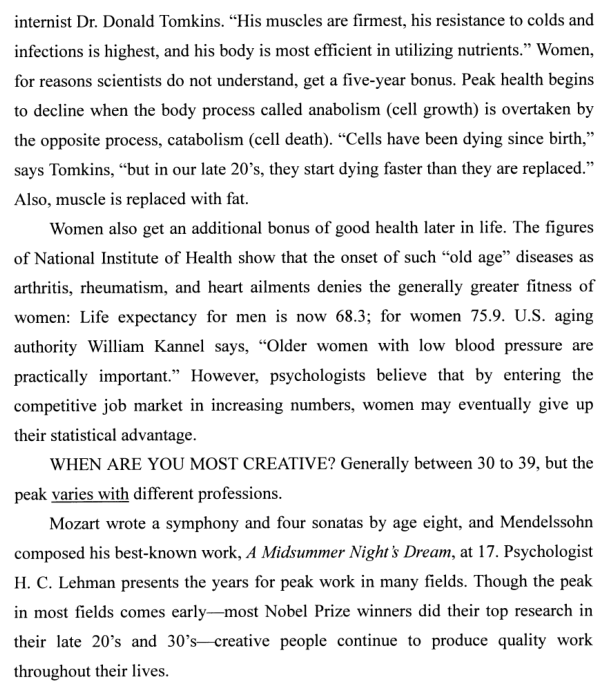
A. people may have to go through the hard times
B. the ups and downs of life cannot be avoided
C. life patterns may not be told in advance
D. people may not have a happy life
A. a woman is in her best shape in her late 20's
B. a man is in his best shape in the decade before age 30
C. the peak health period for men is 5 years shorter than that for women
D. the peak health period for women is 10 years longer than that for men
A. women are as suitable for the competitive job market as men
B. career women may lose their advantages in life expectancy
C. career women usually have lower blood pressure
D. women are fit for any kind of jobs
A. is different with
B. adapts to
C. is opposite to
D. goes with
A. Creative people usually produce their peak work at the age of 30 to 39
B. Most Nobel Prize winners reach their peak before their 30's
C. Creative people produce work of high quality all their lives
D. People do not produce fine work in their old age
Passage Two
The age of gilded youth is over. Today's under-thirties are the first generation for a century who can expect a lower living standard than their parents. Rese into the lifestyle and prospects of people born since 1970 shows that they likely to face a lifetime of longer working hours, lower job security and hi taxes than the previous generation.

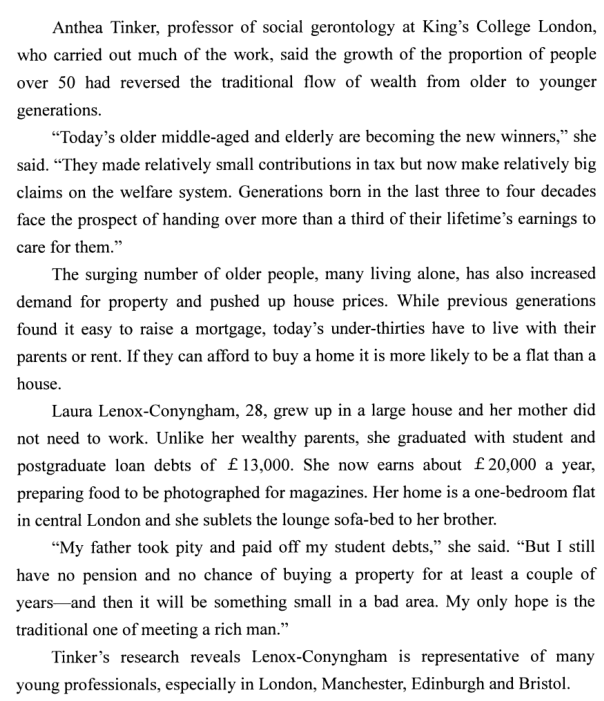
A. nowadays wealth flows from younger generations to the older ones
B. nowadays wealth flows from older generations to the younger ones
C. the traditional way of accumulating wealth has been reversed
D. long- established traditions have already been reversed
A. they enjoy more privileges in the present society
B. they contribute less tax but claim more welfare
C. they know how to save up more money
D. they can make money easily
A. The higher rent for a flat
B. The increasing demand for bigger houses
C. The easier application for a mortgage loan
D. The increasing number of older people living alone
A. marrying a rich man
B. taking photographs for magazines
C. subletting the lounge sofa-bed to her brother
D. preparing food for photographs for magazines
A. Laura is a representive of people of all ages
B. life can get harder for people who are under-thirties
C. the older generations are leading a miserable life
D. the younger generations still enjoy high living standards
Passage Three
Disillusionment with government and politics has contributed to the public’s fascination with the medians increased interest in the character issue. The public's growing concern with character may be considered instinctual. Too often, in recent past, voters have reached out to candidates with neatly packaged virtues—characteristics they often fail to have in reality.

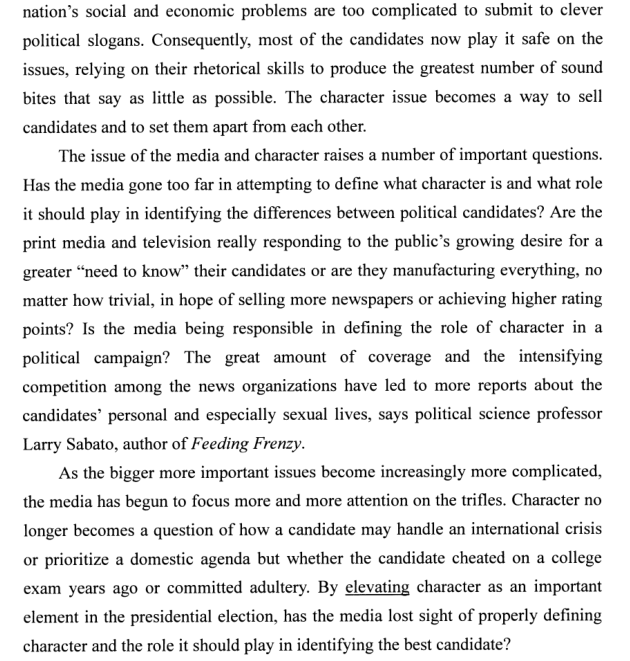
A. the character of the political candidates
B. the differences between political parties
C. social and economic problems
D. government and politics
A. should be strongly emphasized
B. can be a crucial factor in the presidential election
C. should not become involved in the presidential election
D. could be a good way to identify the political candidates
A. The public's growing desire to define the role of character
B. The severe competition among the media outlets
C. The differences between political candidates
D. The sense of responsibility of the media
A. lifting
B. regarding
C. cultivating
D. evaluating
A. comment on the positive role of the media in the presidential election
B. present the roles of the media and character in a political campaign
C. express the worry of the public about political campaigns
D. explain why the public has a growing interest in politics
Passage Four As the first generations grow up in a wired world, teenagers hardly know a time when computers weren’t around, and they leap at the chance to spend hours online, chatting with friends and searching the web for their interested topics. So what?

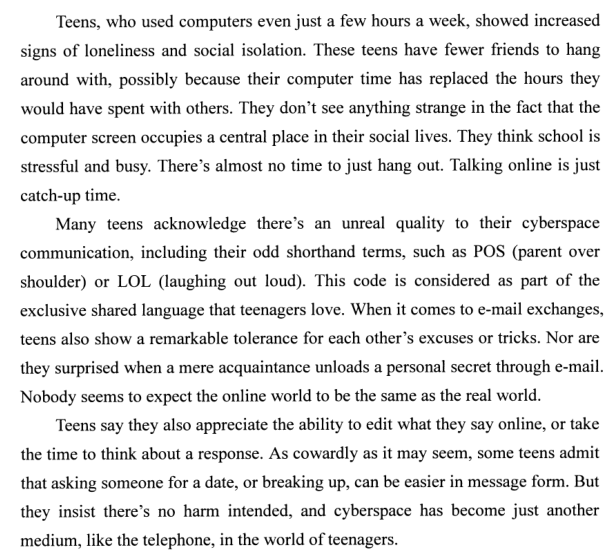
A. teens tend to keep away from people around them
B. teens are indifferent to face-to-face communication
C. teens don't know about a life without computers around
D. teens are spending too much time on the Internet each day
A. they think school is too boring
B. they don't see their social life strange
C. they have few friends to hang out with
D. they think computer contact is easier than face-to-face contact
A. Cyberspace communication has an unreal quality
B. The teens would not approve of excuses and tricks in emails
C. Teenagers enjoy uploading their personal secrets through email
D. The odd shorthand terms used online by teenagers carry no meaning
A. they can get more chances to ask someone for a date
B. it takes less time when expressing ideas by messages
C. they no longer have to edit what they want to say online
D. it can bring them a lot of convenience in communication
A. socially active
B. more ambitious
C. socially awkward
D. more cowardly
Not all kids are cut out for college, despite the expectations of their parents or teachers. And especially in the brave new world of the 21st century, not all kids need to go to college right after high school—or ever—to succeed, says J. Michael Farr, author of America’s Top Jobs for People Without a Four-Year Degree.

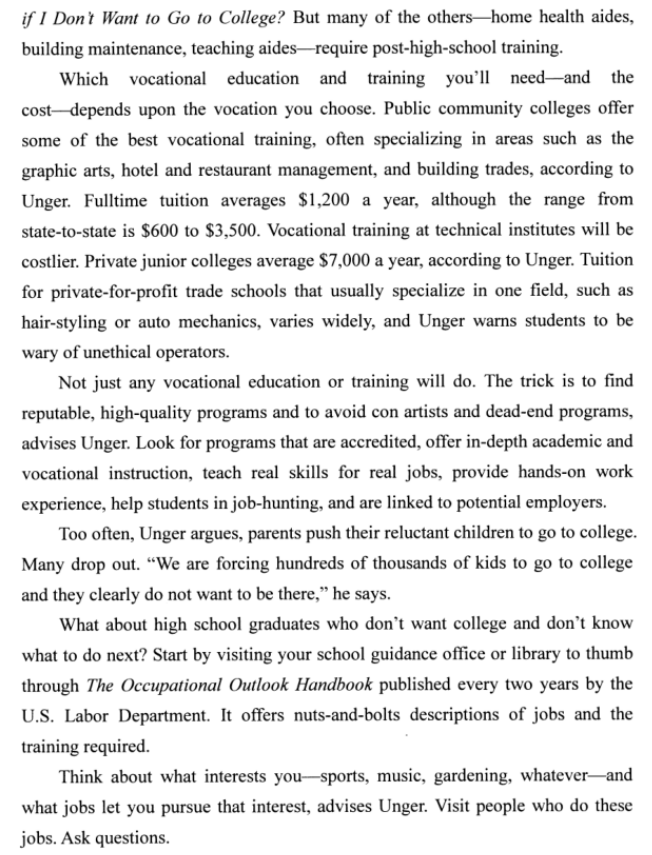

 最新推荐
最新推荐
 相关试卷
相关试卷

 原创试题专区
原创试题专区 开通学校服务
开通学校服务






